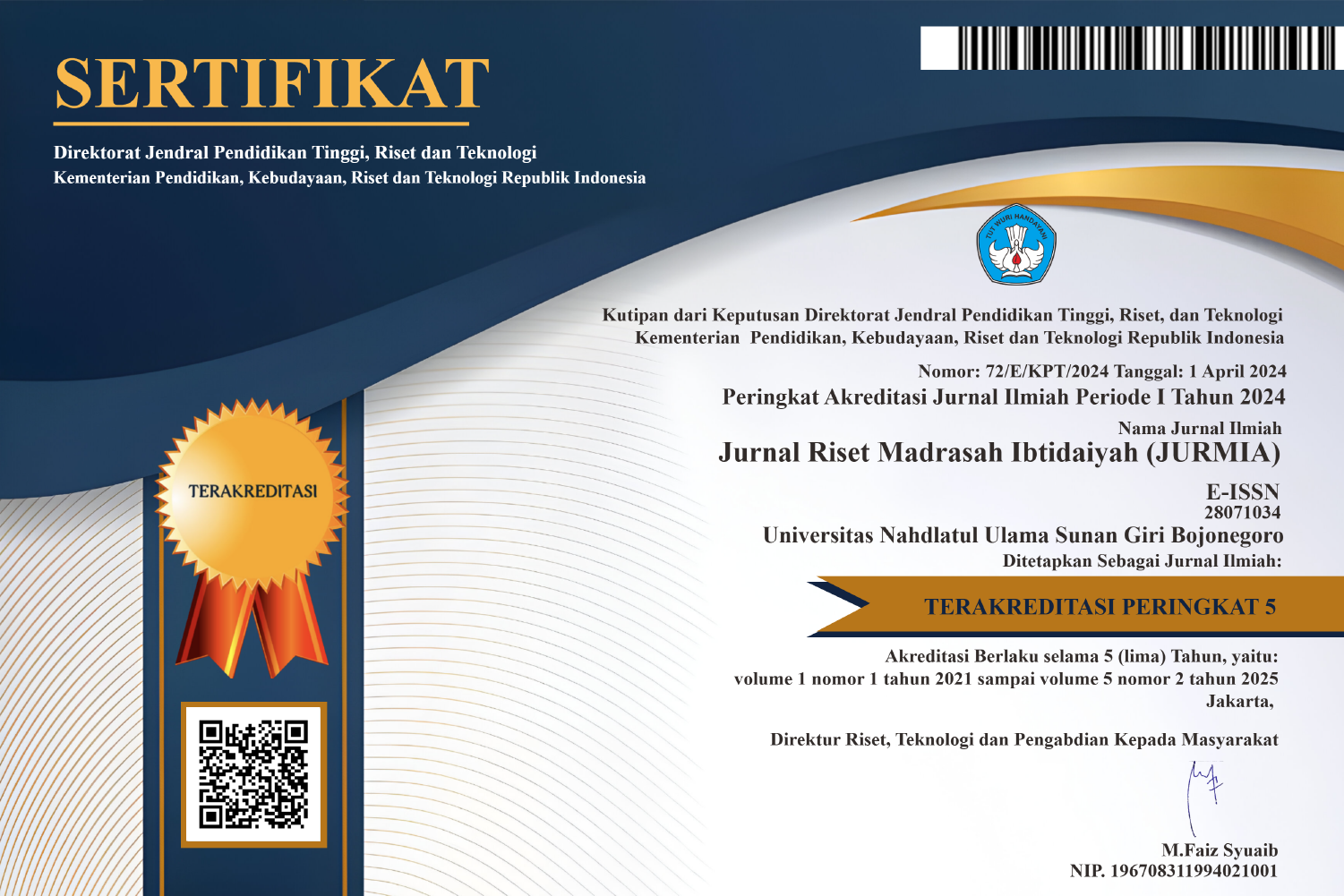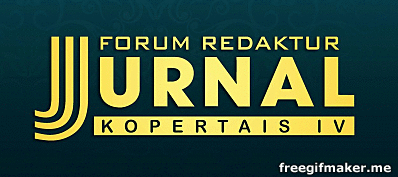Deskripsi Tingkat Pemahaman Pembuatan Modul Ajar Kurikulum Merdeka pada Calon Guru MI UIN Mahmud Yunus Batusangkar

DOI:
https://doi.org/10.32665/jurmia.v3i2.1857Keywords:
Kurikulum Merdeka, Modul Ajar, PemahamanAbstract
Making teaching modules that are effective and in accordance with the Independent Curriculum is important so that the learning process can run well. This study aims to analyze the level of understanding of semester 6 PGMI teacher candidates in making teaching modules for. The research method used was descriptive research, with a number of 6th semester PGMI teacher candidates as participants. Data were collected by distributing questionnaires and structured interviews to randomly selected participants. Questionnaires and interviews focused on the prospective teacher's understanding of the principles of the Mardeka Curriculum. The results showed that most of the 6th semester PGMI teacher candidates had an adequate understanding of the principles of the Mardeka Curriculum. However, their ability to design teaching modules still needs to be improved. Some of the obstacles faced by prospective teachers in making modules include a lack of knowledge about learning techniques that are in accordance with the Mardeka Curriculum, limited resources, and a lack of training in developing teaching modules. Based on these findings, it is suggested that there is an increase in training and mentoring of 6th semester PGMI teacher candidates in making teaching modules that are in accordance with the Mardeka Curriculum. In addition, it is also necessary to increase the available resources to support the process of making effective teaching modules. Thus, it is hoped that the 6th semester PGMI teacher candidates can develop relevant and high-quality teaching modules in the implementation of the Mardeka Curriculum.
References
Amini, F., Munir, S., & Lasari, Y. L. (2022). Studens Mathematical Problem Solving Ability in Elementary School: The Effect of Guided Discovery Learning. Journal of Islamic Education Students (JIES), 2(2), 49. https://doi.org/10.31958/jies.v2i2.5592
Ana, A. N. F., Safrizal, & Sunarti. (2023). Analisis Kesulitan Guru Dalam Mengimplementasikan Kurikulum Merdeka. MUBTADI: Jurnal Pendidikan Ibtidaiyah, 4(2), 96–110. https://doi.org/10.19105/mubtadi.v4i2.8043
Anastasha, D. A., & Movitaria, M. A. (2021). Peningkatan Aktivitas dan Hasil Belajar Matematika menggyunakan Model Kooperatif Tipe Stdents Teams Achievement Divisoan di Madrasah Ibtidaiyah. 5(4), 2626–2634.
Ayu Anastasha, D., & Adyna Movitaria, M. (2019). Constructivist Learning Approach to Improve Student Response and Outcomes Learning. 4th International Conference on Education, 73–78.
Dewi Niswatul Fithriyah, Suttrisno, Nurul Mahruzah Yulia, & Fiki Dzakiyyatul Aula. (2022). Dampak Pembelajaran Daring Selama Pandemic Terhadap Kemampuan Kognitif Peserta Didik. Jurnal Riset Madrasah Ibtidaiyah (JURMIA), 2(1), 173–180. https://doi.org/10.32665/jurmia.v2i1.275
Iskandar, S., Rosmana, P. S., Farhatunnisa, G., & Mayanti, I. (2023). Implementasi Kurikulum Merdeka Di Sekolah Dasar. 3.
Latmini Lasari, Y. (2021). Online Learning Classroom Management During the Covid-19 Period At Pgmi Iain Batusangkar. Jurnal Kepemimpinan Dan Pengurusan Sekolah, 6(1), 49–62. https://doi.org/10.34125/kp.v6i1.520
Maulinda, U. (2022). Pengembangan Modul Ajar Berbasis Kurikulum Merdeka. Tarbawi, 5(2), 130–138.
Safrizal, S., Nurhafizah, N., Yulia, R., & Husnani, H. (2022). Analysis of Guru Penggerak Programs as Sustainable Professional Development for Teachers. AL-ISHLAH: Jurnal Pendidikan, 14(2), 2135–2142. https://doi.org/10.35445/alishlah.v14i2.829
Safrizal, S., Sastri, W., Anastasha, D. A., & Syarif, M. I. (2022). Realistic Mathematic Education untuk Meningkatkan Aktivitas dan Hasil Belajar Matematika Siswa Sekolah Dasar. Edukatif : Jurnal Ilmu Pendidikan, 4(3), 4805–4812. https://doi.org/10.31004/edukatif.v4i3.2679
Safrizal, S., Zaroha, L., & Yulia, R. (2020). Kemampuan Literasi Sains Siswa Sekolah Dasar di Sekolah Adiwiyata (Studi Deksriptif di SD Adiwiyata X Kota Padang). Journal of Natural Science and Integration, 3(2), 215. https://doi.org/10.24014/jnsi.v3i2.9987
Setiawan, R. (2022). Pengembangan Modul Ajar Kurikulum Merdeka Mata Pelajaran Bahasa Inggris Smk Kota Surabaya. Jurnal Gramaswara, 2(2), 49–62. https://doi.org/10.21776/ub.gramaswara.2022.002.02.05
Sunarti. (2023). Meningkatkan Kecerdasan Emosional Siswa Melalui Permainan Tradisional Ular Tangga pada Pembelajaran IPA Kelas 4 SDN 024. Tarai Bangun, 6(1), 1–7.
Suryana, D., Yulia, R., & Safrizal, S. (2021). Content Analysis of Al-Qur’an Science Integration in Children’S Animated Serial of Riko the Series on Hujan’S Episode. Ta’dib, 24(1), 93. https://doi.org/10.31958/jt.v24i1.2808
Suttrisno, S., Yulia, N. M., & Fithriyah, D. N. (2022). Mengembangkan Kompetensi Guru Dalam Melaksanakan Evaluasi Pembelajaran Di Era Merdeka Belajar. ZAHRA: Research And Tought Elmentary School Of Islam Journal, 3(1), 52–60.
Suttrisno., N. M. Y. (2022). Teacher Competency Development in Designing Learning in the Independent Curriculum. AL-MUDARRIS: Journal of Education, 5(1), 30–44. https://doi.org/10.32478/al-mudarris.v
Downloads
Published
Issue
Section
License
Copyright (c) 2023 Fitri Nashito, Meliza Silvi, Mella Puspita, Safrizal Safrizal

This work is licensed under a Creative Commons Attribution 4.0 International License.
 PDF Download: 688
PDF Download: 688










